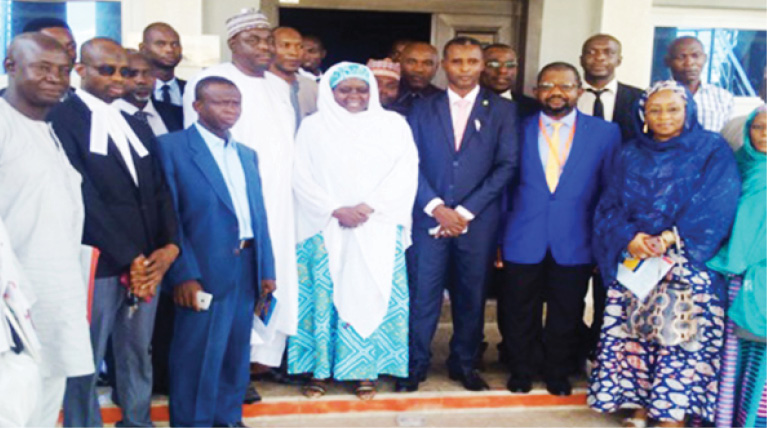Experts suggest reforms in Kano criminal justice system
On Thursday October 25, several justice reform organisations and stakeholders in Kano State recommended important reforms for the criminal justice sector in the state. The Summit on Justice Reforms and Human Rights in Kano State was organized by the Citizens United for the Rehabilitation of Errants (CURE-Nigeria) in conjunction with the North West Zonal office […]

Some of the participants at the Summit on Justice Reforms and Human Rights in Kano State recently
On Thursday October 25, several justice reform organisations and stakeholders in Kano State recommended important reforms for the criminal justice sector in the state.
The Summit on Justice Reforms and Human Rights in Kano State was organized by the Citizens United for the Rehabilitation of Errants (CURE-Nigeria) in conjunction with the North West Zonal office of the National Human Rights Commission (NHRC). The theme was ‘The Role of Human Rights and the Rule of Law in the Administration of Criminal Justice System Reforms and Prison Decongestion in Kano State’.
The forum in its communique, called for grant of financial autonomy to the judiciary, the quick passage of the proposed Administration of Criminal Justice Bill and Child Rights Act, 2003, and use of alternative measures to custodial sentencing to help decongest prisons in Kano State.
While seeking for effective case management system and data collection system in the state criminal justice system, the participants called for collaboration between the state’s three arms of the criminal justice system to work in harmony in the fight against corruption and abuse of power and the rule of law.
Some of the participating agencies included Citizens United for the Rehabilitation of Errants (CURE-Nigeria), National Human Rights Commission (NHRC), Nigerian Bar Association (NBA), National Drug Law Enforcement Agency (NDLEA), and the judiciary.
Others were Legal Aid Council (LAC), Nigerian Prisons Service (NPS), state Ministry of Justice, Nigerian Police, Sharia Courts, Hisba, Young Leaders Right & Patriotic Initiative of Nigeria (YOLPIN) and the media.
In his presentation, the Controller-General of Prisons, Kano State Command, Ahmed Magaji, identified overcrowding as one of the major challenge in the 10 prisons in Kano. He added however that the Federal Government was building three additional prisons in the state comprising two satellite prisons at Karaye and Faruruwa and a 3000-bed capacity maximum security Prison located at Janguza.
There are about 2, 448 pretrial detainees in Kano State. Of this figure, 72 are women with nine babies as well as 38 mentally challenged individuals.
In his opening address, the Executive Director of CURE, Sylvester Uhaa, outlined a correlation between poverty, illicit arms and crimes in the society and overcrowding in prisons and other detention facilities while calling for other means of detention.
“Throughout the world, alternatives to incarceration such as parole, community service, suspended sentences, probation, etc have become very popular and viable options of punishment, decreasing the use of imprisonment. This is not the case in Nigeria. Although the ACJ Act 2015 provides for these options, implementation remains zero, as the courts are sending everyone to prison,” he said.
Making his presentation, Prof Muhammed Tabiu of the Faculty of Law, Bayero University listed three stages of the criminal justice system to include: law enforcement, judicial process and reformatory institutions.
He explained that the proposed Kano State Administration of Criminal Justice bill will enhance the efficiency of the criminal justice administration in the state.
In its speech, the Nigerian Bar Association (NBA) made a case for adoption of more pro bono service by lawyers as provided in Section 3(1) (i) and (k) of the NBA Constitution to enhance access to justice in the state.
